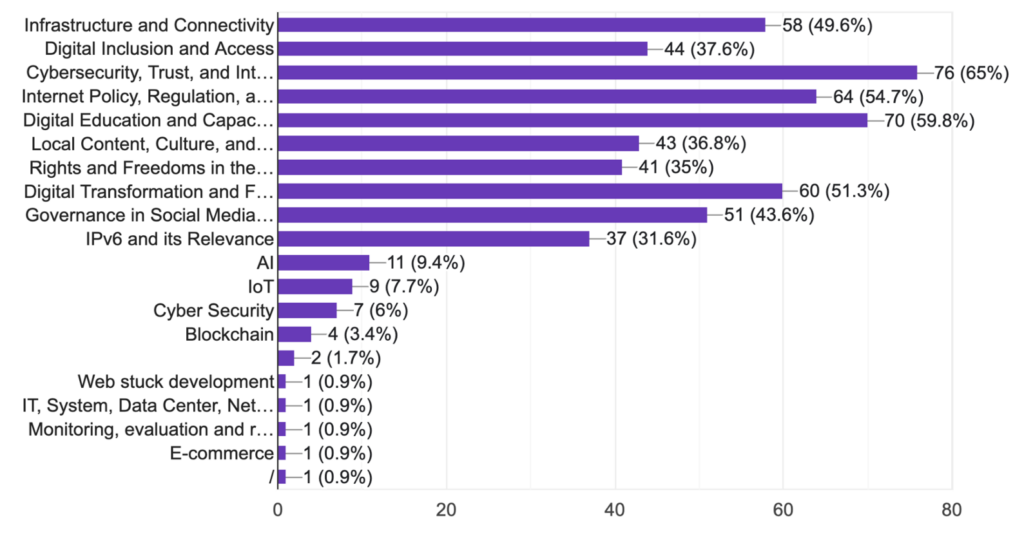
The Afghanistan School on Internet Governance (AFSIG) concluded its fourth edition last month, marking a successful virtual return after a three-year hiatus. Established in 2017, AFSIG is regarded as one of the oldest Internet governance schools in South Asia. Its mission is to promote Internet knowledge through training, mentoring, community engagement, and collaboration.
Because of the recent situation in the economy, there were concerns that AFSIG and similar activities in Afghanistan might not reoccur. However, upon its return, AFSIG drew active participation from 60 attendees, with 29.4% women. Organized by the Internet Society Afghanistan, AFSIG 2023 was sponsored by the APNIC Foundation and supported by the UN Secretariat for the IGF, ICANN, APNIC, and the IGF Support Association.
AFSIG 2023 was unique for several reasons:
- It was organized after a three-year break mainly because of political unrest.
- Its organizing committee was woman-led.
- The organization was carried out entirely by a global team of connected individuals demonstrating that virtual teams are becoming a norm.
Issues and topics of interest
Figure 1 highlights the key concerns raised by attendees with cybersecurity, trust, and Internet safety (65%) being the most significant followed by digital education and capacity building (59.8%), digital transformation and future tech (51%), infrastructure and connectivity (49.6%), and governance in social media and IoT dynamics (43.6%).

To address community demand, AFSIG 2023 attracted senior executives and experts from notable organizations across the business, operational, and technical domains. They covered important topics, including the history and evolution of the Internet, the Internet governance ecosystem and role of ICANN, services offered by Regional Internet Registries (RIRs) and other I* organizations, Internet infrastructure and security, cybersecurity and norms, open radio access network (O-RAN), big data, the metaverse, AI and its governance, and skills and opportunities for Internet professionals.
Key takeaways
The wealth of information, knowledge and experiences contributed by these geographically diverse speakers and trainers included several key takeaways that resonated with me:
Internet knowledge and security: It is crucial to promote the Internet and governance-related learning among citizens. The training offered through AFSIG sessions benefits collective knowledge across the economy on topics such as Internet management, operations, core technologies, systems, and security.
ICANN’s role: To foster collaboration and an inclusive Internet ecosystem it is important to acknowledge the role of ICANN in engaging stakeholders on local, regional, and global levels.
APNIC’s services and resources: Various economies in the region could benefit from better understanding APNIC’s role in the distribution and management of Internet number resources. Positioned at the edge of the APNIC service region and surrounded by economies served by the RIPE NCC, Afghanistan holds the potential to greatly contribute to APNIC’s vision of a global, open, stable, and secure Internet. Development of Afghanistan’s Internet, its network and infrastructure will only be possible when there is sufficient capacity in place, thus ongoing skill building is crucial.
Skills and capacity building: As the Internet and technologies spread across rural communities, digital literacy and skills become more important. In addition, for future tech readiness, we must understand its role and adopt a focused and actionable approach to building skills around it.
Internet governance framework: Local understanding of the Internet and its evolution can be built through ICANN, APNIC, IGF and WSIS meetings and the available resources. Informed digital policy decisions can help ensure the realization of the 2030 Agenda for Sustainable Development and the 17 Sustainable Development Goals (SDGs).
Spectrum management and its impact: Improving knowledge sharing is crucial in Afghanistan, particularly regarding the role and impact of O-RAN and acknowledging the contribution of agencies in skill building.
Internet fragmentation: A greater understanding of the challenges posed by technical and regulatory fragmentation would benefit the economy. Creating opportunities for open discussions in alignment with the goals of a global interoperable Internet will help overcome these challenges.
AI governance: For responsible AI development and use it is important to acknowledge the role of the IGF Policy Network on AI (PNIA), which recognizes the importance of global conversation on AI governance and provides clear recommendations for the future. The initiatives must also encourage participation from diverse stakeholders and underrepresented economies.
Wrapping up
The discussions at AFSIG 2023 made it evident that fostering learning and knowledge sharing on these subjects is crucial. This approach is anticipated to play a key role in the development of a more inclusive and secure Internet in Afghanistan. Additionally, it is expected to contribute significantly to a globally interoperable Internet and shape the digital future positively. Public benefit needs to be at the core of efforts related to the development of the Internet and emerging technologies.
Looking forward, the AFSIG events may benefit from earlier planning that includes identifying key issues and topics collaboratively with stakeholders and developing the program through a participatory process. Beyond the meetings, engagement with APNIC, the APNIC Foundation, and ICANN can support these crucial conversations beyond just the event.
The views expressed by the authors of this blog are their own and do not necessarily reflect the views of APNIC. Please note a Code of Conduct applies to this blog.

The Internet Society simulcast of the Afghan 1GF 2023 is at https://isoc.live/17121/
I am yet to segment and archive it, but I plan to over the next few days.